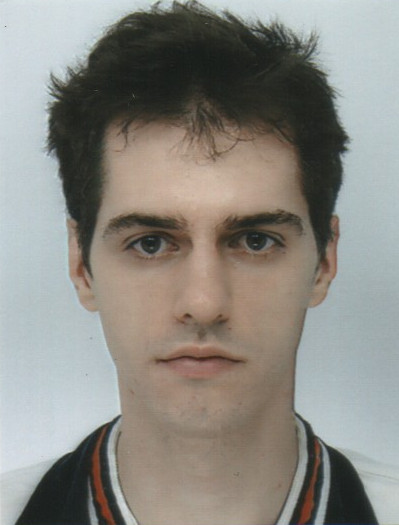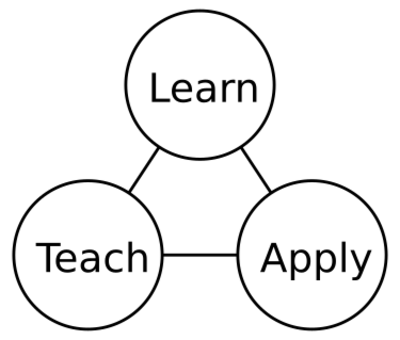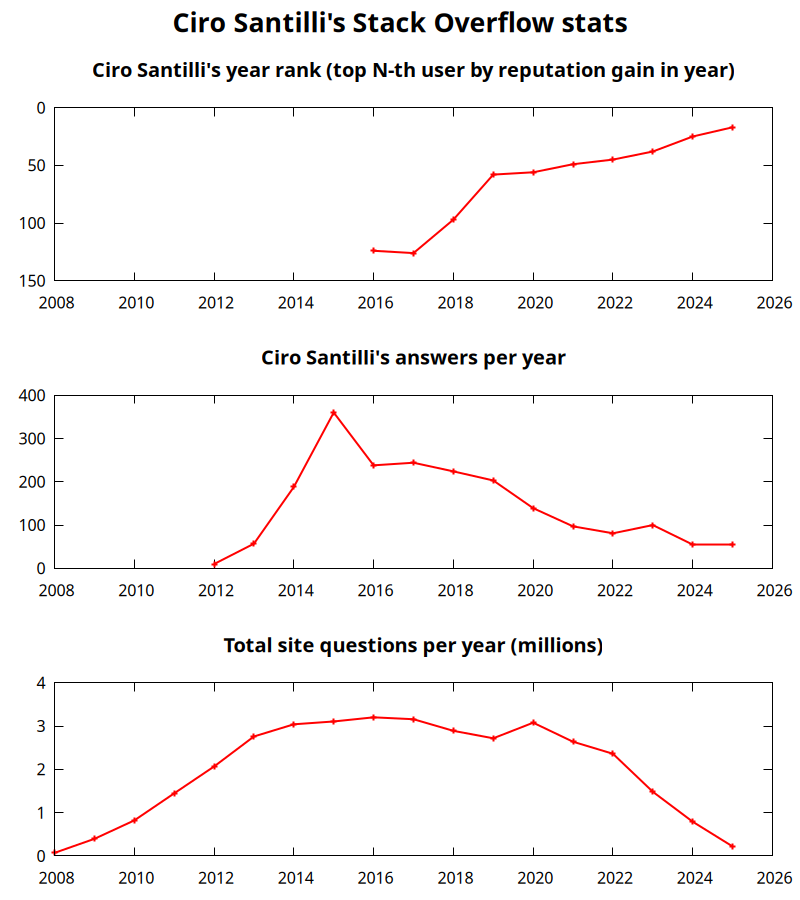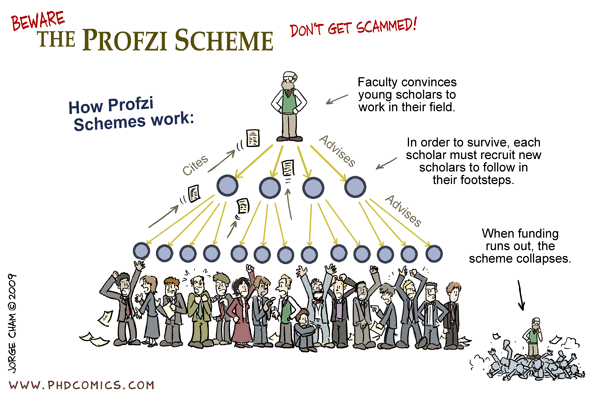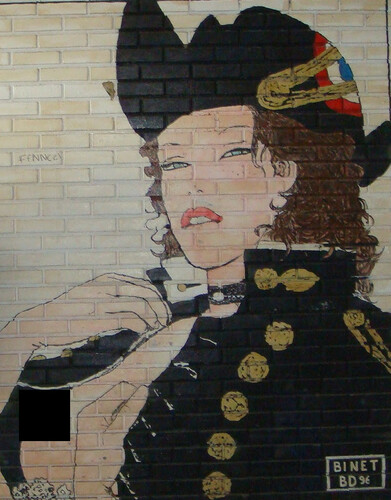Home Updated 2025-12-02
Check out: OurBigBook.com, the best way to publish your scientific knowledge. It's an open source note taking system that can publish from lightweight markup files in your computer both to a multi-user mind melding dynamic website, or as a static website. It's like Wikipedia + GitHub + Stack Overflow + Obsidian mashed up. Source code: github.com/ourbigbook/ourbigbook.
Sponsor me to work on this project. For 400k USD I will quit my job or not get a new job and work on OurBigBook full time for a second year to try and kickstart The Higher Education Revolution. Status: ~44k / 400k USD. At 4M USD I retire/tenure and work on open STEM forever. How to donate: Section "Sponsor Ciro Santilli's work on OurBigBook.com".
I first quit my job 1st June 2024 to work on the project for 1 year after I reached my initial 100k goal mostly via a 1000 Monero donation. For a second follow up year, I increased my requirement to 400k USD to give me more peace of mind as I'm destroying my career in the process. A second year greatly improve chances of success: on year one I improved my tech, on year two I want to come guns blazing to solve courses and get users.
Mission: to live in a world where you can learn university-level mathematics, physics, chemistry, biology and engineering from perfect free open source books that anyone can write to get famous. More rationale: Section "OurBigBook.com"
Explaining things is my superpower, e.g. I was top user #39 on Stack Overflow in 2023[ref][ref] and I have a few 1k+ star educational GitHub repositories[ref][ref][ref][ref]. Now I want to bring that level of awesomeness to masters level Mathematics and Physics. But I can't do it alone! So I created OurBigBook.com to allow everyone to work together towards the perfect book of everything.
My life's goal is to bring hardcore university-level STEM open educational content to all ages. Sponsor me at github.com/sponsors/cirosantilli starting from 1$/month so I can work full time on it. Further information: Section "Sponsor Ciro Santilli's work on OurBigBook.com". Achieving what I call "free gifted education" is my Nirvana.
This website is written in OurBigBook Markup, and it is published on both cirosantilli.com (static website) and outbigbook.om/cirosantilli (multi-user OurBigBook Web instance). Its source code is located at: github.com/cirosantilli/cirosantilli.github.io and also at
cirosantilli.com/_dir and it is licensed under CC BY-SA 4.0 unless otherwise noted.To contact Ciro, see: Section "How to contact Ciro Santilli". He likes to talk with random people of the Internet.
GitHub | Stack Overflow | LinkedIn | YouTube | Twitter | Wikipedia | Zhihu 知乎 | Weibo 微博 | Other accounts
Besides that, I'm also a freedom of speech slacktivist and recreational cyclist. I like Chinese traditional music and classic Brazilian pop. Opinions are my own, but they could be yours too. Tax the rich.
Let's create an educational system with:
- no distinction between university and high school, students just go as fast as they can to what they really want without stupid university entry exams
- fully open source learning material
- on-demand examinations that anyone can easily take without prerequisites
- granular entry selection only for space in specific laboratories or participation in specific novel research projects
I offer:
- online private tutoring for:
- any STEM university course
- passionate younger STEM students (any age) who want to learn university level material and beyond. Can your kid be the next Fields Medalist or Nobel Prize winner? I'm here to help, especially if you are filthy rich! I focus moving students forward as fast as they want on and on producing useful novel tutorials and results
Let your child be my Emile, and me be their Adolfo Amidei, and let's see how far they can go! I will help take your child:and achieve their ambitious STEM goals!- into the best universities
- into the best PhD programs
- educational consulting for institutions looking to improve their STEM courses
- do you know that course or teacher that consistently gets bad reviews every year? I'll work with the teacher to turn the problem around!
- are you looking to create a consistent open educational resources offering to increase your institutions internationally visibility? I can help with that too.
My approach is to:For minors, parents are welcome to join video calls, and all interactions with the student will be recorded and made available to parents.
- propose interesting research projects. The starting point is always deciding the end goal: Section "Backward design"
- learn what is needed to do the project together with the student(s)
- publish any novel results or tutorials/tools produced freely licensed online, and encourage the student to do the same (Section "Let students learn by teaching", digital garden)
I have a proven track of explaining complex concepts in an interesting and useful way. I work for the learner. Teaching statement at: Section "How to teach". Pricing to be discussed. Contact details at: Section "How to contact Ciro Santilli".
I am particularly excited about pointing people to the potential next big things, my top picks these days are:I am also generally interested in:
- quantum computing
- AGI research, in particular AI code generation, automated theorem proving and robotics
- assorted molecular biology technologies
- 20th century physics, notably AMO and condensed matter
- the history of science, and in particular trying to look at seminal papers of a field
Ciro Santilli's amazing Stack Overflow profile
. Ciro contributes almost exclusively by answering question he Googles into out of his own need, and never by refreshing the newest question of big tags for low hanging fruit! More information at: Section "Ciro Santilli's Stack Overflow contributions".Ciro Santilli's Stack Overflow stats
. Further methodology details at: Figure "Ciro Santilli's Stack Overflow stats".The problem with education by Ciro Santilli
. Source. In this video Ciro Santilli exposes his fundamental philosophy regarding why Education is broken. This philosophy was the key motivation behind the failed OurBigBook Project.OurBigBook Web topics demo
. Source. The OurBigBook topic feature allows users to "merge their minds" in a "sort by upvote"-stack overflow-like manner for each subject. This is the killer feature of OurBigBook Web. More information at: docs.ourbigbook.com/ourbigbook-web-topics.OurBigBook dynamic article tree demo
. Source. The OurBigBook dynamic tree feature allows any of your headers to be the toplevel h1 header of a page, while still displaying its descendants. SEO loves this, and it also allows users to always get their content on the correct granularity. More information at: docs.ourbigbook.com/ourbigbook-web-dynamic-article-tree.OurBigBook local editing and publishing demo
. Source. With OurBigBook you can store your content as plaintext files in a Lightweight markup, and then publish that to either OurBigBook.com to get awesome multi-user features, or as a static website where you are in full control. More information at: docs.ourbigbook.com/publish-your-content.Top Down 2D continuous game with Urho3D C++ SDL and Box2D for Reinforcement learning by Ciro Santilli (2018)
Source. More information: Section "Ciro's 2D reinforcement learning games". This is Ciro's underwhelming stab at the fundamental question: Can AGI be trained in simulations?. This project could be taken much further.Water Margin tribute to Chinese dissidents by Ciro Santilli (2022)
Source. Part of Ciro Santilli's campaign for freedom of speech in China, see also: cirosantilli.com/china-dictatorship/water-margin.Lenovo ThinkPad T430 running a BIOS hello world
. This uses Ciro Santilli's project x86 bare metal examples with source code at: github.com/cirosantilli/x86-bare-metal-examplesLinux Kernel Module Cheat presentation
. Source. This project, with source code at: github.com/cirosantilli/linux-kernel-module-cheat, aims to be the perfect emulation setup to study and develop the Linux kernel, kernel modules, QEMU, gem5 as well as x86_64, ARM userland and baremetal assembly and more.My Bitcoin inscription museum by Ciro Santilli
. Source. Introductory video to Section "Cool data embedded in the Bitcoin blockchain". -------------------------------------
| Force of Will 3 U U |
| --------------------------------- |
| | //////////// | |
| | ////() ()\////\ | |
| | ///_\ (--) \///\ | |
| | ) //// \_____///\\ | |
| | ) \ / / / / | |
| | ) / \ | | / _/ | |
| | ) \ ( ( / / / / \ | |
| | / ) ( ) / ( )/( ) \ | |
| | \(_)/(_)/ /UUUU \ \\\/ | | |
| .---------------------------------. |
| Interrupt |
| ,---------------------------------, |
| | You may pay 1 life and remove a | |
| | blue card in your hand from the | |
| | game instead of paying Force of | |
| | Will's casting cost. Effects | |
| | that prevent or redirect damage | |
| | cannot be used to counter this | |
| | loss of life. | |
| | Counter target spell. | |
| `---------------------------------` |
| l
| Illus. Terese Nelsen |
-------------------------------------Code 1.
ASCII art of a Force of Will Magic: The Gathering card inscribed in the Bitcoin blockchain
. Artist unknown, uploaded December 2014. Part of Section "Cool data embedded in the Bitcoin blockchain" where Ciro Santilli maintains a curated list of such interesting inscriptions.
This was a small project done by Ciro for artistic purposes that received some attention due to the incredible hype surrounding cryptocurrencies at the time. Ciro Santilli's views on cryptocurrencies are summarized at: Section "Are cryptocurrencies useful?".
YellowRobot.jpgJPG image fully embedded in the Bitcoin blockchain depicting some kind of cut material art depicting a yellow robot, inscribed on January 29, 2017.
Ciro Santilli found this image and others during his research for Section "Cool data embedded in the Bitcoin blockchain" by searching for image fingerprints on every transaction payload of the blockchain with a script.
The image was uploaded by EMBII, co-creator of the AtomSea & EMBII upload mechanism, which was responsible for a large part of the image inscriptions in the Bitcoin blockchain.
The associated message reads:This is one of Ciro Santilli's favorite AtomSea & EMBII uploads, as it perfectly encapsules the "medium as an art form" approach to blockchain art, where even non-novel works can be recontextualized into something interesting, here depicting an opposition between the ephemeral and the immutable.
Chiharu [EMBII's Japanese wife] and I found this little yellow robot while exploring Chicago. It will be covered by tar or eventually removed but this tribute will remain. N 41.880778 E -87.629210
2010 Wayback Machine archive of starwarsweb.net
. This website was used as one of the CIA 2010 covert communication websites, a covert system the CIA used to communicate with its assets. More details at: Section "CIA 2010 covert communication websites".
Ciro Santilli had some naughty OSINT fun finding some of the websites of this defunct network in 2023 after he heard about the 2022 Reuters report on the matter, which for the first time gave away 7 concrete websites out of a claimed 885 total found. As of November 2023, Ciro had found about 350 of them.
2010 Wayback Machine archive of noticiasmusica.net
. This is another website that was used as one of the CIA 2010 covert communication websites. This website is written in Brazilian Portuguese, and therefore suggests that the CIA had assets in Brazil at the time, and thus was spying on a "fellow democracy".
Although Snowden's revelations made it extremely obvious to the world that the USA spies upon everyone outside of the Five Eyes, including fellow democracies, it is rare to have such a direct a concrete proof of it visible live right on the Wayback Machine. Other targeted democracies include France, Germany, Italy and Spain. More details at: USA spying on its own allies.
This investigative report by Ciro Santilli was featured on the Daily Mail after 404 Media reported on it in 2025.
Diagram of the fundamental theorem on homomorphisms by Ciro Santilli (2020)
Shows the relationship between group homomorphisms and normal subgroups.
Used in the Stack Exchange answer to What is the intuition behind normal subgroups? One of Section "The best articles by Ciro Santilli".
Spacetime diagram illustrating how faster-than-light travel implies time travel by Ciro Santilli (2021)
Used in the Stack Exchange answer to Does faster than light travel imply travelling back in time?. One of Section "The best articles by Ciro Santilli".Average insertion time into heaps, binary search tree and hash maps of the C++ standard library by Ciro Santilli (2015)
Source. Used in the Stack Overflow answer to Heap vs Binary Search Tree (BST). One of Section "The best articles by Ciro Santilli".Birch and Swinnerton-Dyer conjecture in two minutes by Ciro Santilli
. Source. Quick and direct explanation of the statement of the BSD conjecture for people who know basic university mathematics. This is one of the Millennium Prize Problems, and you will get a million dollars if you can solve it! This therefore falls in the Simple to state but hard to prove of Ciro Santilli's the beauty of mathematics aesthetics.Top view of an open Oxford Nanopore MinION
. Source. This is Ciro Santilli's hand on the Wikipedia article: en.wikipedia.org/wiki/Oxford_Nanopore_Technologies. He put it there after working a bit on Section "How to use an Oxford Nanopore MinION to extract DNA from river water and determine which bacteria live in it" :-) And he would love to document more experiments like that one Section "Videos of all key physics experiments", but opportunities are extremely rare.A quick 2D continuous AI game prototype for reinforcement learning written in Matter.js, you can view it on a separate page at cirosantilli.com/_raw/js/matterjs/examples.html#top-down-asdw-fixed-viewport. This is a for-fun-only prototype for Ciro's 2D reinforcement learning games, C++ or maybe Python (for the deep learning ecosystem) seems inevitable for a serious version of such a project. But it is cute how much you can do with a few lines of Matter.js!
HTML snippet:
<iframe src="_raw/js/matterjs/examples.html#top-down-asdw-fixed-viewport" width="1000" height="850"></iframe> Academia is broken Updated 2025-07-16
Sometimes Ciro Santilli regrets not having done a PhD. But this section makes him feel better about himself. To be fair, part of the merit is on him, part of the reason he didn't move on was the strong odour of bullshit oozing down to Masters level. A good PhH might have opened interesting job opportunities however, given that you don't really learn anything useful before that point in your education.
Profzi scheme by PhD Comics
. A Ponzi scheme that trains people in new skills is not necessarily a terrible thing. It is a somewhat more useful version than standard exam based education.
Perhaps the problem is "forcing" 35 year olds to go down that path when they might also want to have boring stuff like families and security.
If people could get to the PhD level much, much sooner, it wouldn't be as obscene: Section "Students must be allowed to progress as fast as they want".
Advanced Placement Updated 2025-07-16
Ainan Celeste Cawley Updated 2025-07-16
His father fought a lot with the stupid educational system to try and move his son to his full potential and move to more advanced subjects early.
A crime of society to try and prevent it. They actually moved the family from Singapore to Malaysia for a learning opportunity for the son. Amazing.
This is the perfect illustration of one of Ciro Santilli's most important complaints about the 2020 educational system:and why Ciro created OurBigBook.com to try and help fix the issue.
Bibliography:
Ainan Cawley: Child prodigy (2013)
Source. - youtu.be/Ugi74cwPMSg?t=137 finding the right school
Backward design Updated 2025-07-16
Steve Jobs has a great quote about this. He's totally right on this one!
You've got to start with the customer experience and work backwards to the technology. You can't start with the technology and try to figure out where you're going to sell it.
Steve Jobs Insult Response excerpt from the 1997 WWDC
. Source. TODO understand the context of the question a bit better. It is something to do with an OpenDoc thing and Java.Decide your goal first, and then do whatever is needed to how to reach it.
Don't start randomly learning tech, because that means you will waste a lot of time learning useless stuff.
There is of course some level chicken-and-egg paradox in this, as highlighted by Dilbert, since choosing an achievable goal in the first place requires some level of technical understanding.
However, it is much more common that people will get way too involved in learning useless stuff and lose sight of the useful end goals.
Rather, take an iterative approach:
There is some truth to the counter argument that "but if you don't spend a lot of time learning the basics, you can never find solutions".
However, these people underestimate your brain. The brain is beautiful, and human intuition is capable of generating interest towards the things that are actually useful to reach your goal. When you feel like learning something related to your goal, by all means, give yourself the time to do so. But this still be much more efficient than just learning random things that other people tell you to learn.
Bibliography:
- Ciro Santilli and many many others believe that backward design is a fundamental principle that should be considered by the educational system rather than wasting 90% of everyone's time with the 90% of mandatory curricula they don't care about:
- notably that school should be personalized and project driven:
- www.cartalk.com/content/rant-and-rave-36 "The New Theory of Learning" by Thomas L. Magliozzi section "Premise III: THE BACKWARDS LEARNING THEORY" says the exact same thing. Ciro actually found this when writing Cool data embedded in the Bitcoin blockchain.
- several well known teaching methods:
- a Coding Horror software specific take on this issue: blog.codinghorror.com/please-dont-learn-to-code/
- x.com/7etsuo/status/1784787045157900697: George Hotz
Everyone I've met who can program well learned it the same way: they had an idea, and then they built it.
École Polytechnique Updated 2025-07-16
The "most prestigious French engineering school". Only 3 Nobels though as of 2019, the scientists are mostly at École normale supérieure (Paris). A gazillion CEOs ad politicians however.
Ciro Santilli studied there from 2010 to 2013.
Ciro considers him entering at Polytechnique a small miracle. First, on his second year of University in Brazil, he first had to fail to join the also good but not as good École centrales, which really annoyed him as he saw the "other good students" who wanted to go out get their wish. This also explains why there are so few students from his university going to Polytechnique in the late 2010's: most already went to other locations! Then, on his third year, he tried Polytechnique and got in despite feeling that the others who got in knew much more mathematics and physics than him. Rather, Ciro believes that he got in chiefly due to his intense passion for the sciences which he showed during the interview.
The miracle would have been even greater if it had happened in 2020. At this time, out of 10 Brazilians, 9 are from ITA, the "hardest to get into" university in Brazil, and also military like Polytechnique. Make no mistake, those students are amazing and deserve it without any doubt. But there is more to the story. It could be argued that many of them only go because they don't have any other choice of exchange program. Remember: Ciro had to fail applications on previous universities before getting into Polytech. Also, they don't get any Brazilian degree because ITA has no agreements with Polytechnique, and are therefore extremely likely to never come back. Not that Ciro thinks this is particularly bad for Brazil though, but it does make for a better deal for France overall as well. They also happen to have closer ties across cohorts of different years, and have managed to maintain a Google Doc with scanned past examinations (as of 2020 however, some/all of those examinations have been uploaded publicly, big kudos to them). Also almost all of them are software engineers, which is one of the few disciplines given at the relatively small ITA. This lack of diversity might not be ideal: if I were France, I would rather fish around all top Brazilian schools for "the best".
Besides the amazing funding/opportunities/alumni/staff loop which you can read about elsewhere, Polytechnique is amazing because you can choose what you will study every year to a very large extent.
This is in huge contrast to the crappy systems Ciro had seen e.g. in Brazil's Polytechnic School of the University of São Paulo, where students have to decide basically all their courses in huge packages, either at university entry (thus when they are completely clueless), or at a single point inside the university studies, changes being much harder.
Life quality was also amazing. Good free accommodation on campus and at the time a no-obligations scholarship for every foreign student great sport facilities. It seems that after Ciro left however more restrictions are added to the scholarships, what a shame! As of 2020 not everyone gets scholarships anymore it seems, mostly only loans that have to be paid back later. And those who are not poor have to pay Polytechnique scholarship fees on top of their living costs. And thus French austerity measures are undermining the greatest long term investment a country can possibly make: that of importing the very best students from other countries into yours. This after their host country has already spent 20 years raising and selecting them. And you won't even pay them 2 years of frugal existence to steal some of them them. Even if those students move away from your country later on, the contacts they made in your country mean they are much more likely to bring businesses over. But some will stay. Basically, France is becoming more like the United States.
This also makes it much more difficult for those students to do a PhD afterwards, where they would get paid very little, and are unable to pay their student debts. A PhD would be where they would possibly bring more of the next big thing to your country. Instead, they are much more likely to just go work for some big American company data wrangling and bring nothing to your country but their student debt dividends instead, which they will be pay to pay for in one year with those amazing salaries. And unsurprisingly many go to into banks. What a big time fail, France.
Sport was mandatory due to the military nature of the school. This did have the upside of getting students together more, although Ciro is against all forms of forced intellectual of physical activities for students. If you liked your sport it would be really cool though. But due to Section "Ciro Santilli's knee", he was forced to give up his first beloved choice which was soccer... life can be cruel. If only Ciro had known cycling at at the time, and if only that had been one of the sports you could choose (but of course it isn't, no school will want the bad reputation of when one of their students gets killed in a car accident).
There were also some useless "military exercises", or special situations in which you had to wear the useless school uniform as a formal "respect social clothing". Ciro Santilli is completely against all that meaningless bullshit, this his just a form of theatrical masturbation to nostalgically remember the good old days of Napoleon when France still ruled the world, and before they tortured the Algerians, see also: Video 4. "Gérard Fuchs interview from Ils racontent la Guerre d'Algérie (1982)". If you are going to do military-like stuff, then at least teach students how to shoot modern rifles and modern warfare tactics (which some of the French students actually do in the pre-school mandatory internship), and not this 18th century bullshit. Ciro favours of course the hoodie-wearing, "I only care about your abilities meritocracy" culture of Silicon Valley. And without the political correctness now associated with it in the 2020s. And no shooting people if possible.
During the time Ciro was at Polytechnique in early 2010's, the school was really isolated in the Plateau de Saclay, there were no shops in 10 minute walking distance! You either had to climb 300 steps to go down to the nearest village, Lozère, or take a bus to the nearest town, Massy. The fact that Times Higher Education ranked it as the second best university in the world in 2019 (archive) makes it good justice, given the small 500 student body. Things started to change a bit after Ciro left however, with the creation of the Polytechnic Institute of Paris, which is bringing other schools to the Lozere area. This is for the best, as it might improve the global rankings of Polytechnique. Also it is a waste to have so few students at a technopole. But it will reduce the mystique of the place. You can't have everything in life.
Before 1976, Polytechnique was actually in the center of Paris at the Latin Quarter, so the Lozère mystique is not a traditional thing. But even when in Paris, students were in theory restricted to school grounds a most of the time. Although there are famous stories of a certain tree that could be used to climb the fence to go to Parisian parties when they couldn't stand it anymore. The tree was somewhat intentionally overlooked by school administrators. Polytechnique was drawn to Saclay no doubt because of the gravity of the CEA Paris-Saclay, France's analog to the United States Department of Energy national laboratories.
This made for some good memories though. The isolation favored concentration, and gave the place a mystical feeling. And then when you went to eat amazing Chinese food in Paris it just felt even more special and magic since you were so limited during the week. It was also under those magical circumstances in which Ciro met his wife, another student of the school, see also: Section "The main function of university is sexual selection".
Ciro also agonized about passing courses to get useless grades though! Polytechnique is hard for most Brazilians, specially if you select the more mathematics oriented courses, because the French students were math brainwashed for two years before joining.
Ciro's favorite spots/activities:
- hide in top corner desk of the library to learn some science. Ciro loves libraries.
- weekend days in his awesome room learning Chinese
Figure 1. The room also has a bed and toilet, it was great, and it was free back in those days! Only the kitchen was shared, which is good for meeting people. And for getting your password keylogged in the shared supplies buying system. This actually happened while Ciro was at in Polytechnique, but the keylogger operator was caught, and the semi-secret-unknown-participants-Gestapo-like-but-mostly-head-of-school-approved student association "Khômiss" broke their door (which leads to an internal corridor) with a fire axe, their traditional way of saying that someone fucked up. All students live on campus, which is great for concentration. - randomly go study at night in one of the small 20 person classrooms that were used in the day and left open at night
Figure 3. A typical small classroom at École Polytechnique. Source. The tables are shown in the usual course configuration. Imagine that at night, in pure silence, with some of your best friends studying on a nearby room. The usual course configuration was first a course by the main teacher in a large amphitheater, and then break down into small groups with tutors, known in French as "Petites classes" (PC). In some English-speaking world traditions, such small class system is known as recitation class. While those small classes are a reasonable approach, Ciro Santilli's slow brain would rather just have a book and an online forum where tutors answer questions instead.
Horny Polytechnicienne mural by Binet BD
. Edit: Ciro noticed this mural had been removed as of 2023. Of course it was removed! TODO removal date. TODO photo of the new art that took its place, it seems to be a boring image of R5-D4. Fucking political correctness zealots. A perfectly fine piece of erotica artwork lost forever except for this photo of it. Thanks to Ciro's kinky friend, Mr. F. for in his infinite insight insisting on taking a picture of it.
Every year, student organizations, the binets, get to compete for student elections, and they are allowed to make murals in the school to advertise themselves.
They kinky people from the 1996 Cartoon Binet (BD == Band Dessiné == Cartoon in French) decided to take it to the next level, with the depiction of a horny polytechnicienne, on the corridor near the student bar, the Bôbar, in front of the cartoon library of the Binet BD.
Good old 1996, this would never be allowed in 2019 due to political correctness.
Let's see how much longer it will last.
How about adding a sexy male polytechnicien suggestively holding his theatrical sword (nicknamed the "tangente") with shirt open instead of removing the lady???
In 2022, sexual aggression accusations at Polytechnique surfaced, will the mural survive them?
Ciro heard of two other mural censorship events orally from younger students during a visit in 2023:
- there was a sexy girl from Judo also censored since
- Judo (again) also apparently used a red resing sun symbol that some Chinese students felt was too close to the Japanese war flag: en.wikipedia.org/wiki/Rising_Sun_Flag. This made Ciro feel a strong urge to advertise his mirror of github.com/cirosantilli/china-dictatorship at gitlab.binets.fr/ciro.duran-santilli/china-dictatorship just to test the supposed French obsession with freedom of speech!
Polytechnicienne by Ecole polytechnique
. Source. Promotional documentary in French showing the situation of women at Polytechnique. Ciro couldn't resist putting it next to the horny polytechnicienne.
Of particular note is is the footage of the first year in which women were accepted, 1972: youtu.be/IA1kSC_d4R8?t=298, shortly before Polytechnique moved from central Paris to Lozère in 1976.
www.mondedesgrandesecoles.fr/egalite-femmes-hommes-polytechnique-et-sa-communaute-sengagent claims that as of 2019 only 14% of the students were women.
The following promotional videos give an idea of how the school looks like, although they fundamentally miss the little corners that Ciro really loved in that the place and which made it magic:
And a one second Ciro Santilli appearance from a 2016 video made during the annual Brazilian barbecue (or as close as you an get to it) which many ex-Brazilian students attend able: www.youtube.com/watch?v=ndX_-A2Rjpo&t=189 wearing a Ring t-shirt.
Gérard Fuchs interview from Ils racontent la Guerre d'Algérie (1982)
Source. French. Title translation: "they tell the story War in Algeria". In this segment at this timestamp, French politician and ancient Polytechnician tells of his experience in Algeria, to which all Polytechnicians were sent for 2 years after graduating as part of their mandatory service to the French state. He is not notable enough to have an English Wiki page however unfortunately.
He mentions that the huge scale military operations they did were useless, they enemies could easily notice and escape before they had closed in. He then chose a job in intelligence, the alternative being special operations, without fully knowing what it was going to be. He then once walked into his colleague during an interrogation where torture had obviously been used. He claims however that he managed to forbid torture under his command. He was then gravely shot, but survived.
He then mentions that when he came back and started digesting the experience, he felt that democracy was not enough, and that to actually stop wars people needed to be better informed and have a more direct democracy (a point Ciro Santilli agrees with), and that kind of made him want to become a politician. He looks like a nice guy.
On a related note, the exact same "Maquis"/"Maquisard" is used in French to describe both French WWII Resistance fighters, as well as the Algerian revolutionaries, as the south of France has a somewhat similiar dry bushy region where the revolutionaries would hide. And the French were like the Gestapo in Algeria.
Free gifted education Updated 2025-07-16
This term was invented by Ciro Santilli, and similar ideas certainly already exists with different names by other people. As the name suggests, it basically involves combining free education and gifted education, but with other more specific aspects crammed in that would make a precise name too long to read, as descried below.
Government must create selective, K-12 and university-level teaching institutions that are completely free.
As mentioned at pick few good bets and invest enough on bets, these do not need to be given to all students: what we have to do is to ensure that the top N-percent of the best students will get in, and that none of them will pay. Where N is as large as the budget society decides to put into this project, the larger the better. Therefore, perhaps "gifted education" is not the ideal name for this idea, as it generally implies very small N (1%?), while this project hopes for larger N, maybe 10%. But a minimal level of quality must be attained, it is pointless to dissolve the resources too much, if we only have enough for 1%, then so be it, start with 1%.
These institutions must start from the very first school year, and go all the way up through K-12 to the end of university. It is useless to start at university-level only otherwise only the rich students will have a chance of getting in, like Ciro Santilli saw in Brazil at the Polytechnic School of the University of São Paulo in the late 2000's: one day all students were gathered in the amphitheater, and they asked the students who had only gone through free government K-12 schools to raise their hands. Those were notably worse than the corresponding private schools, and the situation is inverted in university, where the best schools are the government ones. Out of about 500 people, at most 10 raised their hands!
These institutions should not have affirmative action entry quotas, including most importantly at the university level. Both rich and poor should be able to apply. Passing the selection criteria is all that matters. We just must ensure that the schools are widely advertised amongst disadvantaged communities, so that they will at least get their children to try to apply from an early age. This way, even if the rich always have an advantage due to better overall conditions, the poor are so much more numerous that the majority of students accepted will still be poor.
The school should follow the basic principles of how to teach, notably:
- students must have a flexible choice of what to learn. There will be no classes, all learning will happen either OurBigBook.com or on 1-to-1 meeting with tutors, or in discussions with fellow students.The term "gifted education" might suggest elitism, but Ciro Santilli strongly believes that different people have different skills, and that if everyone could focus on whatever it is that they want to do in life, be it engineering or the arts, rather than just pass a bunch of useless exam, then having the 10% "best" of each interest group would already cover a huge percentage of the population.
- Through it, students will be helped to directly achieve their greater life goals.There will be no teachers: each student will be assigned senior advisors, and together they will come with an individualized research proposal or business plan.There will be no useless mandatory institutional exams. Exams only need to be taken if a given advisor requires it to filter candidate students. But if you manage to impress them through other means, they can just accept you without the exam.A fundamental part of this is to fill the the missing link between basic and advanced. We want to help students to reach the state of the art of their field of interest as fast as possile.
- group students by interest, not by age
These schools must pay mentors as much as the average good non-free schools so you actually get comparably good teachers. Mentor selection would also be highly competitive, just as that of the students.
Once admitted, students will have guaranteed access to the school resources for a few years. This way, they won't need to worry about passing useless exams every three months.
All that matters is that they are progressing in their development plan. Rather than exams, students will do regular progress report sessions with their advisors, and will get periodic reviews from other advisors with similar interests.
Such projects could be funded by much needed wealth tax or other measures to tax the rich, which the people should claim through Referendum, that would be come more common with the adoption of electronic voting. Because the politicians are simply not being able to do it.
Gallatin School of Individualized Study Updated 2025-07-16
How to diagnose a genius by Wilhelm Ostwald (1909) Updated 2025-07-16
From the abstract:Ciro Santilli couldn't agree more... notably students must have a flexible choice of what to learn.
Much money, his student went on to say, is spent by various Governments in attempting to discover those people whose thorough education may be expected to bring in a return of value to the State, and the question how best to discover latent genius is an eminently practical one. After cogitation, Prof. Ostwald came to the conclusion that it is those students who cannot be kept on the rails - that is, who are not contented with methodical teaching - who have within them the seeds of genius
How to teach Group students by interest, not by age Updated 2025-07-16
Rather, we should group students by subject of interest; e.g. natural sciences, social sciences, a sport, etc., just like in any working adult organization!
This way, younger students can actually actively learn from and collaborate with older students about, see notably Jacques Monod's you can learn more from older students than from faculty.
This becomes even more natural when you try to give students must have a flexible choice of what to learn.
This age distinction should be abolished at all stages of the system, not only within K-12, but also across K-12, undergraduate education and postgraduate education.
This idea is part of the ideal that the learning environment should be more like a dojo environment (AKA peer tutoring, see also dojo learning model), rather than an amorphous checkbox ticking exercise in bureaucracy so that "everyone is educated".
Perhaps, even more importantly, is that we should put much more emphasis on grouping students with other students online, where we can select similar interest amongst the entire population and not just on a per-local-neighbourhood basis.
How to teach Help students achieve their goal Updated 2025-07-16
This is the most important of all points.
Don't set goals for your students.
Ask students what they want to do, and help them achieve that goal.
If they don't know what to do, give suggestions of interesting things they could do.
Once they have a goal, just help them learn everything that is needed to achieve that goal
This is because the universe of potentially useful things that can be learnt is infinite, and no human can ever learn everything.
The only solution, is to try and learn only what seems necessary to reach your goal, and just try to reach your goal instead.
This approach is called backward design.
Also, setting overly ambitious goals, is a good idea: the side effects of ambitious goals are often the most valuable thing achieved.
It must be easy to change your area of study Updated 2025-07-16
This is a pre-requisite of Section "Students must have a flexible choice of what to learn".
If the choice of what to learn depend on a years long dependency graph of other obligations, which currently are the increasingly interlinked:you end up without much choice at all.
- passing the University entry exam
- getting your undergrad degree
- getting your PhD
The lock-in periods must be much more fluid and shorter term than those, otherwise it makes the almost inevitable pivots to success impossible.
This is something that Ciro Santilli has heard from several people at the end of their undergrad/PhD degrees. Some online mentions:
Level: Asian Updated 2025-07-16
This is true. The level of competition in university entry exams in Asia in insane in the early 21st century compared to the West.
This is actually both good and bad. Good because it selects some very good exam passers. And bad because it selects some very good exam passers.
Molecular Sciences Course of the University of São Paulo Updated 2025-07-16
Good Portuguese overview: www.scielo.br/scielo.php?script=sci_arttext&pid=S1806-11172017000300301&lng=pt&tlng=pt
A fantastic sounding full time 4-year course that any student could transfer to called that teaches various natural science topics, notably mathematics, physics, chemistry and molecular biology.
Many past students Ciro talked to however share a common frustration with the course: in the first 2 years at least, the "basic cycle", you have infinitely many courses, and no time to study, and no choice of what to study, it is only in the latter 2 years (the advanced cycle) that you get the choices.
Also, if you get low grades in a single subject, your out. And exams are useless of course.
Here's a Quora question in Portuguese about the course: pt.quora.com/Como-funciona-o-tal-do-curso-secreto-da-USP, the only decent answer so far being: pt.quora.com/Como-funciona-o-tal-do-curso-secreto-da-USP/answer/Victor-Soares-31. Very disappointing to hear.
On the advanced cycle, you have a lot of academic freedom. You are basically supposed to pick a research project with an advisor and go for it, with a small amount of mandatory course hours. Ciro was told in 2022 that you can even have advisors from other universities or industry, and that it is perfectly feasible to take courses in another university and validate the course hours later on. Fantastic!!!
Students from the entire University of São Paulo can apply to transfer to it only after joining the university, with the guarantee that they can go back to their original courses if they don't adapt to the new course, which is great!
Around 2007, they were in a really shady building of the University, but when Ciro checked in 2021, they had apparently moved to a shiny new entrepreneurship-focused building. Fantastic news!!!
One of the Brazilians who came to École Polytechnique together with Ciro was from this course. The fact that he is one of the most intelligent people Ciro knows gave further credit to that course in his eyes.
OurBigBook.com Desired social impact Updated 2025-07-16
Crush the current grossly inefficient educational system, replace today's students + teachers + researchers with unified "online content creators/consumers".
Gamify them, and pay the best creators so they can work it full time, until some company hires for more them since they are so provenly good.
Help create much greater equal opportunity to talented poor students as described at free gifted education.
Give the students a flexible choice of what to learn, which basically implies that a much large proportion of students get a de-facto gifted education.
In some ways, Ciro wants the website to feel like a video game, where you fluidly interact with headers, comments and their metadata. If game developers can achieve impressively complicated game engines, why can't we achieve a decent amazing elearning website? :-)
Related:
OurBigBook.com Motivation Updated 2025-07-16
Many subjects have changed very little in the last hundred years, and so it is mind-blowing that people have to pay for books that teach them!
Since Ciro Santilli was young, he has been bewildered by the natural sciences and mathematics due to his bad memory.
The beauty of those subjects has always felt like intense sunlight in a fresh morning to Ciro. Sometimes it gets covered by clouds and obscured by less important things, but it always comes back again and again, weaker or stronger with its warmth, guiding Ciro's life path.
As a result, he has always suffered a lot at school: his grades were good, but he wasn't really learning those beautiful things that he wanted to learn!
First, before university, school organization had only one goal: put you into the best universities, to make a poster out of you and get publicity, so that more parents will be willing to pay them money to put their kids into good university.
Ciro once asked a chemistry teacher some "deeper question" after course was over, related to the superficial vision of the topic they were learning to get grades in university entry exams. The teacher replied something like:Ciro feels that this was one of the greatest compliments he has ever received in his life. This teacher, understood him. Funny how some things stick, while all the rest fades.
You remind me of a friend of mine. He always wanted to understand the deeper reason for things. He now works at NASA.
Another interesting anecdote is how Ciro Santilli's mother recalls that she always found out about exams in the same way: when the phone started ringing as Ciro's friends started asking for help with the subjects just before the exam. Sometimes it was already too hopelessly late, but Ciro almost always tried. Nothing shows how much better you are than someone than teaching them.
Then, after entering university, although things got way better because were are able to learn things that are borderline useful.
Ciro still felt a strong emotion of nostalgia when after university his mother asked if she could throw away his high school books, and Ciro started tearing them all down for recycling. Such is life.
University teachers were still to a large extent researchers who didn't want to, know how to and above all have enough time and institutional freedom to teach things properly and make you see their beauty, some good relate articles:
The very fact that you had very little choice of what to learn so that a large group can get a "Diploma", makes it impossible for people to deeply learn what the really want.
This is especially true because Ciro was in Brazil, a third world country, where the opportunities are comparatively extremely limited to the first world.
Also extremely frustrating is how you might have to wait for years to get to the subject you really want. For example, on a physics course, quantum mechanics is normally only taught on the third year! While there is value to knowing the pre-requisites, holding people back for years is just too sad, and Ciro much prefers backward design. And just like the university entry exams, this creates an entry barrier situation where you might in the end find that "hey, that's not what I wanted to learn after all", see also: students must have a flexible choice of what to learn.
We've created a system where people just wait, and wait, and wait, never really doing what they really want. They wait through school to get into university. They wait through university to get to masters. They wait through masters to get to PhD. They wait through PhD to become a PI. And for the minuscule fraction of those that make it, they become fund proposal writers. And if you make any wrong choice along the, it's all over, you can't continue anymore, the cost would be too great. So you just become software engineer or a consultant. Is this the society that we really want?
And all of this is considering that he was very lucky to not be in a poor family, and was already in some of the best educational institutions locally available already, and had comparatively awesome teachers, without which he wouldn't be where he is today if he hadn't had such advantages in the first place.
But no matter how awesome one teacher is, no single person can overcome a system so large and broken. Without technological innovation that is.
The key problem all along the way is the Society's/Government's belief that everyone has to learn the same things, and that grades in exams mean anything.
Even if you wanted to really learn natural sciences and had the time available, it is just too hard to find good resources to properly learn it. Even attending university courses are hit and miss between amazing and mediocre teachers.
If you go into a large book shop, the science section is tiny, and useless popular science books dominate it without precise experiment descriptions. And then, the only few "serious" books are a huge list of formulas without any experimental motivation.
And if you are lucky to have access to an university library that has open doors, most books are likely to be old and boring as well. Googling for PDFs from university courses is the best bet.
Around 2012 however, he finally saw the light, and started his path to Ciro Santilli's Open Source Enlightenment. University was not needed anymore. He could learn whatever he wanted. A vision was born.
To make things worse, for a long time he was tired of seeing poor people begging on the streets every day and not doing anything about it. He thought:which like everything else is likely derived subconsciously from something else, here Schindler's list possibly adapted quote from the Talmud:
He who teaches one thousand, saves one million.
So, by the time he left University, instead of pursuing a PhD in theoretical Mathematics or Physics just for the beauty of it as he had once considered, he had new plans.
We needed a new educational system. One that would allow people to fulfill their potential and desires, and truly improve society as a result, both in rich and poor countries.
And he found out that programming and applied mathematics could also be fun, so he might as well have some fun while doing this! ;-)
So he started Booktree in 2014, a GitLab fork, worked on it for an year, noticed the approach was dumb, and a few years later started building this new version. The repo github.com/booktree/booktree is a small snapshot of Ciro's 2014 brain on the area, there were quite a few similar projects at the time, and most have died.
Ciro is basically a librarian at heart, and wants to be the next:
- Jimmy Wales
- Brewster Kahle
- Tim Berners Lee
- Tim O'Reilly, who once brilliantly described O'Reilly Media as "a lifestyle business that got out of control" [ref]
- Aaron Swartz. Minus suicide hopefully.
"Jimmy Wales: How a ragtag band created Wikipedia" 2005 TED talk
. Source. Original source: www.ted.com/talks/jimmy_wales_the_birth_of_wikipedia. OurBigBook.com University lecture notes Updated 2025-07-16
Basically everything that applies to the blogs section also applies here, but university lecture notes are so important to us that they deserve a bit more talk.
It is arguable that this is currently the best way to learn any university subject, and that it can already be used to learn any subject.
We basically just want to make the process more efficient and enjoyable, by making it easier:
One major problem with lecture notes is that, as the name suggests, they are merely a complement to the lecture, and don't contain enough detail for you to really learn solely from them without watching the lecture.
The only texts that generally teach in enough depth are actual books, which are almost always commercial.
So in a sense, this project can be seen as a path to upgrade free lecture notes into full blown free books, from which you can learn from scratch without any external material.
And a major way in which we believe this can be done is through the reuse of sections of lecture notes by from other universities, which greatly reduces the useless effort of writing things from scratch.
The intended mental picture is clear: the topics feature docs.ourbigbook.com/#ourbigbook-web-topics will is intended to act as the missing horizontal topic integration across lecture notes of specific universities, e.g:
MIT calculus course UCLA calculus course
* Calculus <---> * Calculus
* Limit <---> * Limit
* Limit of a function
* Limit of a series <---> * Limit of a series
* Derivative <---> * Derivative
* L'Hôpital's rule
* Integral <---> * IntegralExample topics page of OurBigBook.com
. One important advantage of lecture notes is that since they are written by the teacher, they should match exactly what "students are supposed to learn to get good grades", which unfortunately is a major motivation for student's learning weather we want it or not.
One big open question for this project is to what extent notes written for lectures at one university will be relevant to the lectures at another university?
Is it possible to write notes in a way that they are naturally reusable?
It is our gut feeling that this is possible. But it almost certainly requires an small intentional effort on the part of authors.
The question then becomes whether the "become famous by getting your content viewed in other universities" factor is strong enough to attract users.
And we believe that it might, it just might be.
Self-directed learning Updated 2025-07-16
Students must be allowed to progress as fast as they want Updated 2025-07-16
One of the main reasons for Section "Students must have a flexible choice of what to learn".
We've created a system where people just wait, and wait, and wait, never really doing what they really want.
They wait through school to get into university.
They wait through university to get to masters.
They wait through masters to get to PhD.
And for the minuscule fraction of those that make it, they become fund proposal writers.
And if you make any wrong choice along the, it's all over, you can't continue anymore, the cost would be too great.
So you just become software engineer or a consultant until you die.
From True Genius: The Life and Science of John Bardeen Chapter 2 "Roots":
John ([Bardeen].) and Bill ([his brother]) entered the combined seventh-eighth grade at "Uni High," Wisconsin's University High School, in the same year-John from third grade and William from fifth.Established in September 1911, the school had been conceived as a laboratory for training high school instructors and for testing progressive ideas in education. In its philosophy and organization, Uni resembled the Dewey School. The students were accelerated as much as possible to keep lessons challenging. One goal was to "introduce pupils to high school methods and subjects before they reached the 9th grade." The fourth quarter, offered during the summer, allowed students who had missed work or had fallen behind to catch up. It also enabled the brightest students to complete senior high school in only three years...Even with the disruption of Althea’s death, John completed all his Uni High course work by age thirteen. But as he was "a little leery about graduating so young," he and Bill decided to attend Madison Central High School for two years, taking additional mathematics, science, and literature courses not offered at Uni. By the time John had turned fifteen and Bill seventeen, the two had completed every course of interest at Madison Central. There was no longer any reason to postpone entering college. In the fall of 1923 they both entered the freshman class at the University of Wisconsin.
Meanwhile, at the University of Oxford www.theguardian.com/uk/2005/aug/21/highereducation.accesstouniversity Oxford to turn away child prodigiesFUUUUUUUCK. And so, in protecting children, we also rob them of their own future. But the official policy as of 2023 is unchanged at least in theory: uni-of-oxford.custhelp.com/app/answers/detail/a_id/557/~/do-oxford-undergraduate-courses-have-a-minimum-age-requirement%3F Article also mentions Yinan Wang. Can't find his profiles now.
We have been pushed to consider it, not because of concerns about whether it is psychologically healthy for children to study here, but because of child protection laws which have come into play this year for the first time.
Bibliography:
